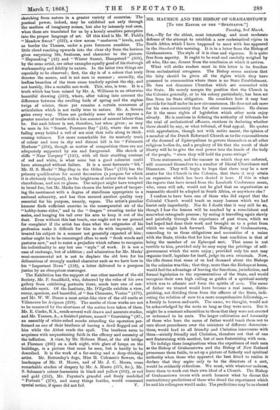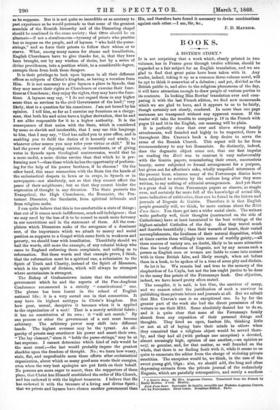MR. MAURICE AND THE BISHOP OF GRAHAMSTOWN [To THE EDITOR
OF THE "SPECTATOR."
Tuesday, 3rd March. SIR, —By far the ablest, most interesting, and most moderate defence of the attempt to establish a new ecclesiastical rigime in South Africa which I have happened to meet with has appeared in the Standard this morning. It is in a letter from the Bishop of Grahamstown. The style of it is clear and vigorous. It is quite free from asperity. It ought to be read and carefully weighed by all who, like me, dissent from the conclusion at which it arrives.
What will strike readers most in this letter is its freedom from ecclesiastical arrogance. The Bishop seems anxious that the laity should be given all the rights which they have possessed in communities where there is no State Establishment. He does not denounce Churches which are connected with the State. He merely accepts the position that the Church in the Colonies generally, or in his colony particularly, has been set free from its State obligation. He considers how it may best provide for itself under its new circumstances. He does not ask more for his own community than for other communities. He claims for it the same rights of legislation which other sects enjoy already. He is cautious in defining the authority of tribunals for the trial of ecclesiastical offences, cautious in declaring whether there should be any, or what tribunal, of final appeal. He quotes with approbation, though not with entire assent, the opinion of a member of the Dutch Reformed Church as to the reasonableness of the demand of Episcopalians to govern themselves as all other religious bodies do, and a prophecy of his that the result of their liberty will be to give the real power into the hands of the body of the people, "since they will hold the purse-strings."
These statements, and the manner in which they are enforced, will commend themselves to a number of liberal Churchmen and Dissenters. They will begin to hope that there may be a new avatar for the Church in the Colonies, that there it may attain an expansion which has been denied it here. If this is what the reports that have issued from the Lambeth Conference mean, who, some will ask, would not be glad that an organization so reasonable should be adopted in South Africa, or anywhere else ?
I confess to have been one of those who did expect that the Colonial Church would teach us many lessons which we had learnt only imperfectly. Nor do I doubt that it may still be so, though I fear the lessons will be reached by a roundabout and somewhat retrograde process ; by seeing it travelling again slowly and painfully through the experience of past times, which we had hoped had done their work and brought us to a point from which we might look forward. The Bishop of Grahamstown, conceding to us these obligations and necessities of a union with the State, thinks that for him the best condition is that of being the member of an Episcopal sect. That name is not terrible to him, provided only he may enjoy the privilege of self- government which the sects enjoy ; provided only his sect may organize itself, legislate for itself, judge its own criminals. Now, the idle dream that some of us had dreamed about the Bishops in the colonies was this; that they, more than the Bishops at home, would feel the advantage of leaving the functions, jurisdiction, and formal legislation to the representatives of the State, and would recognize their own high calling as guides of a spiritual society which was to educate and form the spirits of men. The name of father we trusted would have become a real name, distin- guishing, not dividing them from the officers of the State, indi- cating the relation of men to a more comprehensive fellowship,— a family in heaven and earth. The name, we thought, would not be acknowledged by the sects so long as they were sects. But it might be a constant admonition to them that they were not created or redeemed to be sects. The larger cultivation and humanity of those who bore the name of father would teach them not to care about precedence over the ministers of different denomina- tions, would lead to all friendly and Christian intercourse with them—strictly friendly and Christian, therefore not that of one sect fraternizing with another, but of men fraternizing with men.
To indulge these imaginations when the experience of such men as the Bishop of Grahamstown and the Bishop of New Zealand pronounce them futile, to set up a picture of fatherly and spiritual authority when those who appeared the best fitted to realize it declare that they aspire only to be the directors of a sect, would be evidently ridiculous. We must, with whatever sadness, leave them to work out their own ideal of a Church. The Bishop of Grahamstown treats with much humour what he deems the contradictory predictions of those who dread the experiment which he and his colleagues would make. The predictions may be as absurd
as he supposes. But it is not quite so incredible or so contrary to past experience as he would persuade us that some of the greatest scandals of the Romish hierarchy and of the Dissenting chapel should be combined in the same society ; that tlitre should be an alternate—if not a simultaneous—tyranny of priests who practise but to impose on the people, and of laymen "who hold the purse- strings," and so force their priests to follow their whims or to starve. What, among many causes for shame and humiliation, English Churchmen have to give thanks for, is, that they have been brought, not by any wisdom of theirs, but by a series of divine providences, into a position which, to a considerable degree, exempts them from both these dangers.
It is their privilege to look upon laymen in all their different offices as subjects of Christ's kingdom, as having a vocation from Him. It is not necessary to give laymen a place in Synods, that they may assert their rights as Churchmen or exercise their func- tions as Churchmen ; they enjoy the rights, they may have the func- tions. A layman may say, "I do not regard them in any higher sense than as services to the civil Government of the land ;" very likely, that is a question for his conscience. /am not bound by his opinion. I tell him, so far as I exercise my functions as a clergy- man, that both his and mine have a higher derivation, that he and I are alike responsible for it to a higher authority. It is the consequence of that union with the State, which is considered by some so slavish and intolerable, that I may use this language to him, that I may say, "God has called you to your office, and is enabling you to fulfil the duties of it honestly and wisely, to whatever other source you may refer your virtue or skill." If he had the power of deposing curates, or incumbents, or of giving votes in Synods upon theological controversies, would that be a more useful, a more divine service than that which he is per- forming now ?—than those which he has the opportunity of perform- ing for the help of his poorer brethren, if he chooses ? On the other hand, this same connection with the State ties the hands of the ecclesiastical despots in lawn or in crape, in Synods or in newspapers--not absolutely, not so that they cannot affect the peace of their neighbours ; but so that they cannot hinder the expression of thought in any direction. The State protects the Evangelical, the High Churchman, the Romanist, the Pro- testant Dissenter, the Secularist, from spiritual tribunals and from religions mobs.
I can quite believe that this is too comfortable a state of things ; that out of it comes much indifference, much self-indulgence ; that we may need by the loss of it to be roused to much more fervency in our convictions and in the statement of them. All the com- plaints which Dissenters make of the arrogance of a dominant sect, of the importance which we attach to money and social position as supports to a Gospel which came forth in weakness and poverty, we should hear with humiliation. Thankfully should we hail the words, still more the example, of any colonial bishop who came to England enforcing those complaints, and calling us to reformation. But those words and that example prove, I think, that the reformation must be a spiritual one, a submission to the Spirit of Truth and Charity, instead of the Spirit of Mammon, -which is the spirit of division, which will always be strongest where sectarianism is strongest.
The Bishop of Grahamstown insists that the ecclesiastical government which he and the reports of the Pan-Anglican Conference recommend is a strictly " constitutional" one.
• The phrase has been learnt in the school of English national life ; it is a very sacred one in that connection. It may have its highest antitype in Christ's kingdom. But how poor, unreal, deceptive it becomes when it is applied to the organization of a sect! That is a merely artificial fabric ; it has no constitution of its own ; it "will not march." By one process or other the government of a sect must become arbitrary. The arbitrary power may shift into different lands. The highest overseer may be the tyrant. An oli- garchy of priests may overthrow his power and assert their own. "The lay element," since it "holds the purse-strings," may be at last supreme. I cannot determine which kind of rule would be the most cruel ;—the last would probably impose the greatest shackles upon the freedom of thought. No; we learn how weary, stale, flat, and unprofitable seem these efforts after ecclesiastical organization, about which so many good men waste their energies, even when the very best apologies are put forth on their behalf. No persons are more eager to assert, than the supporters of these plans, that Christ has Himself established the order of His Church, and has endowed it with the highest treasures. I believe that He has endowed it with the treasure of a living and divine Spirit ; that we priests and laymen have chosen another government than
F. D. MAURICE.



































 Previous page
Previous page